Cult Leader
💡 The fish rots from the head!
Godot’s cult leader is definitely Juan Linietsky.

One of Juan Linietsky's avatars - The Robbie
Before delving into the topic, it’s worth noting that Juan Linietsky was born in Argentina. There are many cults in Latin America1, ranging from destructive cults to more controversial ones. Quote from the “Cults in Latin America” article:
The author estimates that more than 5,000 religious groups operate in Argentina, with as many as 50,000 sects and cults throughout Latin America.
Due to this, Juan could consciously or unconsciously adopt cultic techniques to utilize in his own community of Godot followers. As we’ve covered in Value of Waiting chapter, the mere concept of “Waiting for Godot” and the ambiguity that accompanies it create a perfect environment for such cultic engagement.
Juan may have also been influenced by some overzealous Latin American developers wanting to promote their supposed talent to worldwide community. Interestingly, in the past, Juan Linietsky worked as a musician at Sabarasa Entertainment2, a game development company in Argentina.
Historically, expansionist ideologies have been fueled by an “us-vs-them” mentality, as it reinforces the notion of one’s own group deserving dominance or control over others, even under the guise of liberation. The following image ironically suggests some aspects of this, taken from Sabarasa’s main page (upscaled):

Coincidentally, this expansionist mentality can be observed in the behavior exhibited by the followers of Blue Robot Cult themselves:
I'm loving these expansions
— Dennisse Pagán (@PaganDennisse) September 23, 2023
Apologetics
The first concrete thing which comes into focus is Juan’s post on this matter3:
I find surprising that many users of commercial software feel annoyed and threatened by FOSS to the point of despectively calling it a “cult” or a “circlejerk”. Seen it with Linux, Firefox, Blender and now Godot.
If you don’t like it, no need to be unpolite. Live and let live..
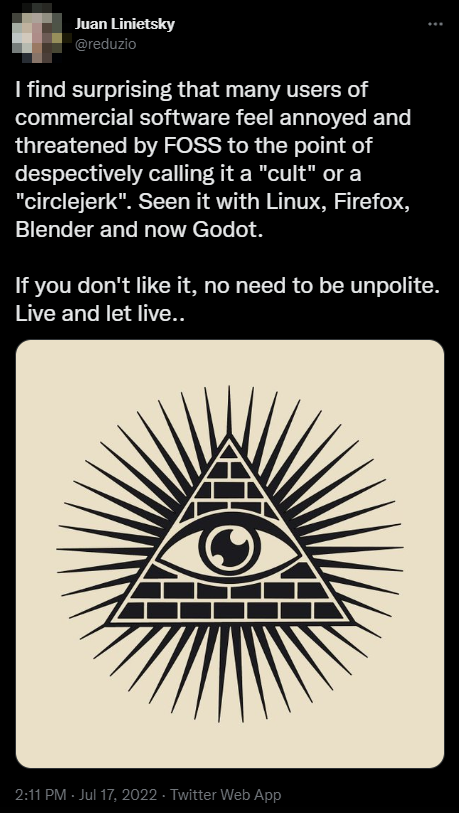
Interestingly, Juan said this at the time when the first edition of this book was being written, and when I, as a former member of Godot, began publicly calling Godot a cult. For this reason, I suspect that what Juan says is mostly a reaction to my own writing about Godot. Let’s analyze his post further.
Don’t be deceived when Juan says that only users of commercial game engines call Godot a cult, as Juan deceptively portrays it. Even then, it’s done in an us-versus-them mentality, which is a definitive sign of a cult. As a toxic leader, Juan creates a perceived threat, something along the lines of “commercial engines want to destroy FOSS”, while commercial engines just go about their business without paying much attention to communities like Godot.
Furthermore, commercial companies can be classified as IT cults to varying degrees, much like open-source organizations. Therefore, it makes no sense to use this divisive narrative to label users of commercial software as the enemy. Such labeling is not only unjust, but also counterproductive. When people consistently describe a project as a cult, it provides an opportunity for project leaders to reflect on why. Most importantly, it’s a chance to ask questions, rather than launch an attack against critics.
Despite the above, it’s truly unsettling to witness some commercial engines unexpectedly sponsoring Godot. Juan’s accusation against users of these engines is like biting the hand that feeds you. Beware of a potential enticement faced by commercial engines to support Godot, driven by the pervasive efforts of Godot advocates infiltrating communities such as Unity and Unreal (you will find one such example at the end of this book). These advocates are found falsely portraying Godot as one of the “world’s third biggest game engines,” a claim that starkly contradicts reality. What is of greater concern is the notion of replacing established engines with Godot, fueled by such misleading assertions.
Juan continues saying “live and let live”. This is how narcissists play the victim to deflect criticism. They induce guilt so that you cannot possibly say anything bad about them or expose their lies, because of this false sense of victimhood. There are testimonies that reinforce the idea that Godot is an actual cult, so Juan finds it necessary to divert the attention from those testimonies and block criticism of Godot.
There’s also another subtle message that Juan is trying to convey here. He hides behind FOSS and other projects like Linux, Firefox, Blender, and implies that Godot is finally being called a cult, while trying to present it as a sign of success. Of course, it’s just a sign. The word “cult” is usually used in a pejorative sense, and cult apologists would like people not to call their organizations cults, because they are4! For this reason, when Juan tries to convince people that Godot is not a cult, it makes him a cult apologist. Healthy organizations do not feel the need to say that they are not cults.
While some communities may exhibit certain cult-like characteristics, it is crucial to differentiate them from outright toxic cults. The former might display traits commonly associated with cults, but they may not reach the extreme levels of toxicity. It is worth noting that the absence of former members describing an organization as a toxic cult from an insider’s perspective could be attributed to their reluctance or fear of speaking out about their experiences. Most individuals decide to move on and actively avoid any potential retaliation from a toxic cult.
it's a pleasure to be part of this cult for so many years 🙇♀️ pic.twitter.com/cfVrYgasAg
— Tumeo 🐧🐇 (@tumeo_) July 17, 2022
Based on the factors described thus far, susceptible followers believe in Juan’s unquestionable and authoritative vision. As a defense mechanism, followers of Godot, who are part of the cult, start making “jokes” about Godot being a cult (yes, the following “joke” is made by a Godot follower)5:
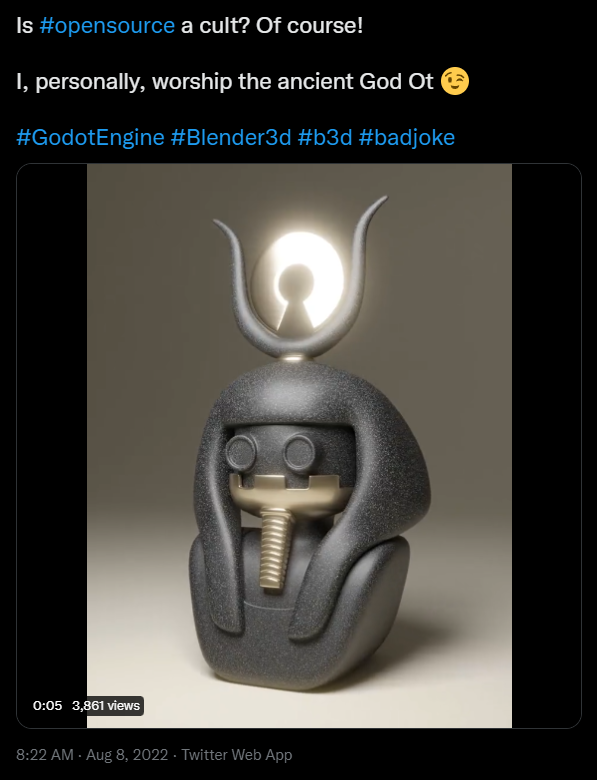
Take note of the #badjoke hashtag. All of this exemplifies cognitive dissonance in action, which serves as another indication of cult-like communities. Typically, people who share authoritative style of thinking (Godot cultists included) are hesitant to make jokes due to the potential negative repercussions imposed by toxic leadership, as they often interpret jokes as insinuations of something truly negative about them or an organization, which is often just two sides of the same coin in the context of mind-manipulating cults.
To reiterate, Godot followers camouflage themselves within Open Source communities by labeling them as cults, thereby implying that projects like Godot also possess cult-like characteristics as if it’s no big deal. While some Open Source projects may display cult-like signs, they may not necessarily be classified as toxic cults. However, if a project displays all or most of those toxic cult signs, then it’s definitely something to be wary of.
In an exercise of curiosity and irony, it is interesting to note that the very word “contribute” originates from the word “tribe”: “contribute” → “tribute” → “tribe”6. These words encompass meanings and notions ranging from “bring together” and “pay” to “barbarous people”. As you delve deeper, you’ll discover why the Godot community can be considered to have truly tribal characteristics, with the NIH syndrome playing a huge rule… 😁
Current situation right now
byu/IamTrubak inUnity3D
And here’s a “joke” by Juan Linietsky himself on this matter:
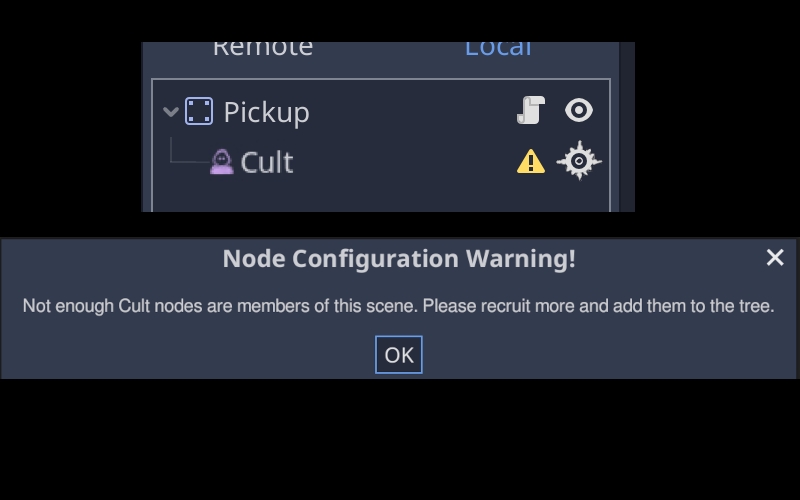
Godot "Cult" Node - Juan Linietsky
Sorry, as with many things in Godot it lacks documentation. These nodes don't do much, you add them to the scene and immediately get a configuration warning that tells you what to do. pic.twitter.com/EGc6odu9EE
— Juan Linietsky (@reduzio) July 17, 2022
There’s one joke: “Every joke has only a fraction of a joke, the rest is all true.” 😉
Cult members are taught, directly or indirectly, to believe that they are special, superior, and that the rest of the world is just ignorant, as evident from Juan’s articles such as “How to make your dream game, publish it and not die in the process”7:
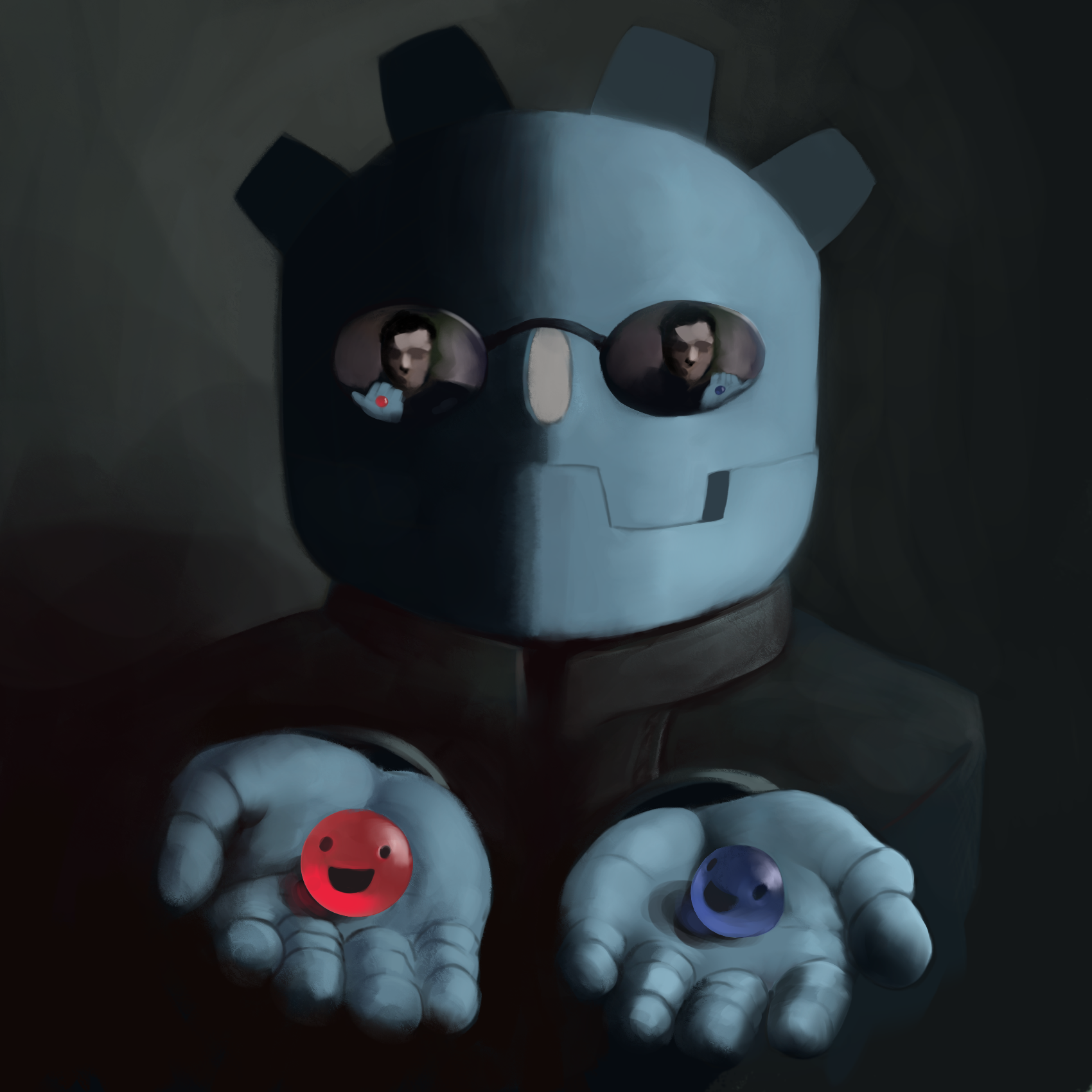
Even applying standard design patterns isn’t warranted to work. One situation I’ve seen repeated over and over as a consultant is having to deal with engineers that lie to themselves [emphasis added] about successfully applying MVC to their game architecture (and making a complete dish of spaghetti and meatballs as a result). Another case is engineers claiming they find success in not using OOP design (while they use it anyway, without realizing it or admitting it). I’ve seen this so many times I can’t count it with my fingers.
In the same article, ironically, he even uses the “cult” word in the context of publishers and their followings, as if it’s a no big deal:
[…] At first, I was angry [emphasis added] at this fact, but I understand now that it’s the most natural course of action to do for a publisher. They are companies, not charities. […] Also, don’t get me wrong on this. Publishers still make a big difference. Even if they don’t invest money in promotion, they usually have very oiled channels with media and many even have cult followings [emphasis added] (like Atlus or Daedalic) that will purchase their games.
Juan uses the same “cult” word to describe a game following8:
I am pretty happy to just find out that a Nintendo GBA RPG game I made the entire OST for almost 20 years ago, not only seems to have a cult following [emphasis added] today but that there are so many people who really enjoyed the sountrack. Very nice way to start my weekend!
Reread Juan’s post at the beginning of the Apologetics section and ask yourself: Why would Juan be offended by Godot being called a cult when this is precisely what he does when describing some companies and people? Juan, if you don’t like it, no need to be unpolite. Live and let live.. 🙃
For students and hobbyists with limited industry knowledge, the supposed “proof” of Juan’s expertise lies in the number of contributors he has working on Godot and the number of followers spreading the word of Godot. Of course, Juan’s implied “solution” to the described “problem” is to use Godot, even though he may not explicitly state it. This purpose is often the driving force behind his articles. They are frequently misleading, as they exploit the fear of missing out (FOMO), fueled further by emotional rhetoric like “not dying.”
Cult members are also discouraged from seeking information or testimonies that might challenge the cult’s doctrine. This makes them more dependent on the cult leader and the group for their sense of identity and reality. Cult members may also rationalize their involvement in the cult by claiming that they are misunderstood. In the case of Godot, this is evident from the jokes that they made, as well as how they react to criticisms:
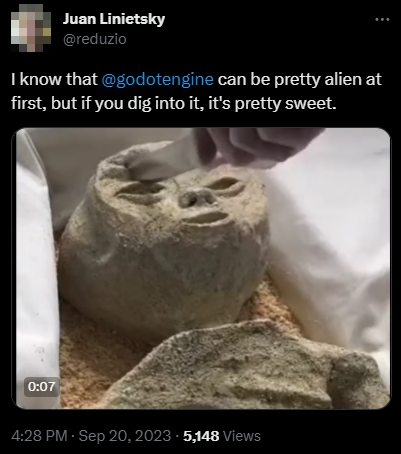
Godot can be pretty alien - Juan Linietsky
Juan posted the above “joke” precisely when Godot experienced a sudden influx of Unity users, with some industry experts criticizing Godot. Initially, Juan acted quite opportunistically in doing so, particularly as he aims to attract unsuspecting contributors and wealthy donors. Simultaneously, Juan is concerned that these Unity users might expose both Godot’s limitations and his agenda, prompting him to behave in this manner, thereby reducing people’s vigilance:
Instead of trying to annoy people to switch to Godot, the best we can do is work hard on our side so Godot becomes as best as possible and fantastic alternative to other engines. It is then that more people will feel more comfortable to come and use it.
— Juan Linietsky (@reduzio) May 5, 2024
Folks, please don’t tell people who are struggling with Unity related issues to use Godot. At this point, I think everyone in the industry knows Godot exists. Please be mindful, Its not an obligation for them to use Godot, and there are hundreds of good reasons to not use it.
Instead of trying to annoy people to switch to Godot, the best we can do is work hard on our side so Godot becomes as best as possible and fantastic alternative to other engines. It is then that more people will feel more comfortable to come and use it.
Wanna take a wild guess if Juan really has a list of “hundreds of good reasons” NOT to use Godot? 🙃
In essense, Juan’s underlying message is that the Godot community is becoming more of a headache. Instead of helping Godot gain industry acceptance, their overzealousness is doing the opposite. Juan is hinting that they should dial back on pushing Godot as the go-to choice. But make no mistake, Juan’s ultimate goal remains unchanged: he still wants to replace or overthrow Unity, no matter what reasoning he offers or what he declares to the public.
It’s worth mentioning that Juan’s renewed career with Godot as a supposedly open-source project began with extensive promotion claiming it was “on par with Unity”—a lofty assertion that didn’t align with reality, especially in 2014. This is evident from an article titled “A New Open-Source Game Engine Being Released” published back in 2014, weeks before Godot went open-source9:
The tech has now proven to be quite mature and is now very complete and according to its developer to be on-par with Unity, or arguably superior to Unity when it comes to the area of 2D and animation support.
Over time, Juan came to realize that propagating such big lies about the capabilities of his pet project became excessive. However, such grandiose claims allowed him to advertise the engine to Unity users without charge, solely relying on the concerted efforts of Godot fans eager to spread the word in hopes of earning Juan’s pat on the back. Take away all the grandiose claims and unpaid endorsements of the engine, and let’s face it, Godot would just fade into obscurity.
Cult of Personality
Community literally creates a cult of personality out of Juan. You can even stumble upon pictures of people that worship Juan himself10:
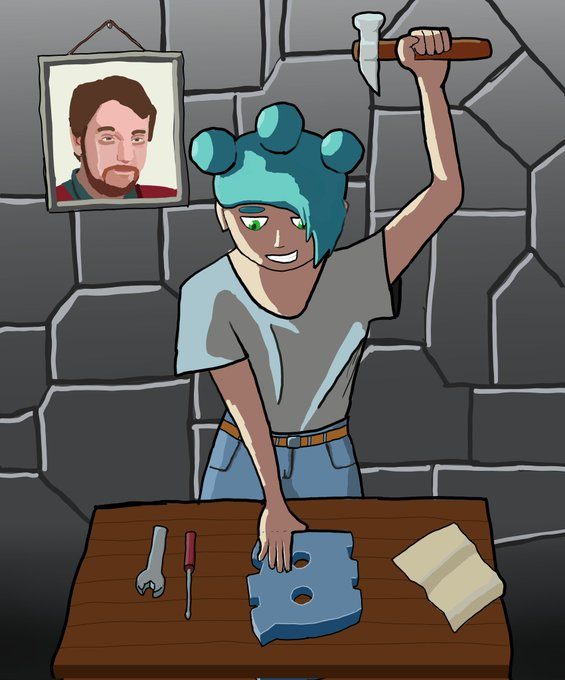
Here, you see a portrait of Juan, and the Godette character working on Godot.
Project manager of Godot, Rémi Verschelde, who is the sub-leader in relation to Juan, calls Juan “the prophet of the engine” at the game development conference (GDC):
In the interview with Press Over, Juan Linietsky was referred to as “El Gran Linietsky,” which translates to “The Great Linietsky.”
Politics
This cult of personality is further confirmed by Juan’s own hidden political views. Juan once written a release article, with a picture suggesting Donald Trump11!

The phrase “Make engines great again” takes inspiration from Trump’s slogan “Make America Great Again.” This connection is significant because experts in the realm of cults, such as Steven Hassan, have identified the existence of a “Cult of Trump.”12 This reinforces the notion that Juan, as the leader of the Godot cult, is likely influenced by such charismatic leaders as perceived by their followers.
By the time of writing this book, Juan deleted this image and replaced it with a “Vote for Godot” image, again, right after I started to describe Godot in terms of a cult. Also, recall Godot’s “Democracy” mental tricks covered in Democracy chapter. These kind of things are definitely deceptive and manipulative, since Godot is in no way a democracy.
Conclusion
If you haven’t had the opportunity to personally know or speak with the lead developer of Godot, it may be challenging to definitively determine whether Juan is indeed a cult leader. Nevertheless, he exhibits all the classic signs of one, demonstrating a mastery of manipulation at an expert level. As you continue reading subsequent chapters, you will hopefully gain insight into the characteristics that make Juan a toxic cult leader. Unraveling his methods and understanding his undue influence on the Godot cult followers and members will shed light on the depth of his manipulation and the potential dangers he poses.
References
Cults in Latin America - Cultic Studies Association.
Sabarasa Entertainment - Sabarasa Entertainment website.
Cult Apologists | Cult Defenders - By Apologetics Index.
Worship the ancient God Ot - By Miskatonic Studio.
Etymology of the word “contribute” - Online Etymology Dictionary.
How to make your dream game, publish it and not die in the process - By Juan Linietsky.
A New Open-Source Game Engine Being Released - By Phoronix.
Juan, Godette and Godot Engine - By Abatta Games.
Make engines great again! - By Juan Linietsky.
The Cult of Trump - By Steven Hassan, 2019.